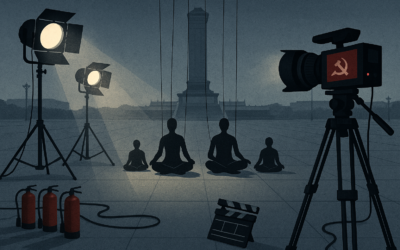Remember the tycoon who said that “Nobody cares about Uyghurs”? It seems that Wall Street does not care about him either.
by Kok Bayraq

According to a recent report, Chamath Palihapitiya’s misleading statements on an investment was one of the causes for his Clover Health Investment’s stock going “from the moon to rock-bottom” in the last six months. He tried to hide the fact that the U.S. Justice Department has been investigating the company on at least 12 issues. According to the report, “Chamath Palihapitiya misled investors on critical issues,” and he “has become notorious on Wall Street.” Elsewhere, he is known as a minority shareholder of the Golden State Warriors, San Francisco’s NBA basketball team.
The damage Chamath did to investors with his dubious initiatives is being evaluated. But what would be the damage from his irresponsible statement that “Nobody cares about Uyghurs,” and his attempt to hide China’s genocide against Uyghurs by saying he is “not even sure that China is a dictatorship?”
Many people were angered by the inhumanity of the statements, the way it ignored American values, and they were also concerned about its impact on the Uyghur people, who are suffering from genocide.
Because more than 3 million Uyghurs are detained in the so-called transformation through education camps and the entire region has become an open prison at the moment, they may not have an opportunity to “enjoy” Chamath’s “outspokenness” and “sincerity” to express the “ugly truth.” Only Uyghurs in exile, including activists, may be affected by the statement in some way.
Given Chamath’s family and financial background and some traditional economic philosophy of Uyghur people, it seems Uyghurs are in a position to overcome such negative statements.This point can also unravel the mystery of how failures and disasters can actually strengthen oppressed people. Let’s look at the matter according to the way the Uyghur people think.
The Uyghurs have a proverb: “Let the rich man’s son speak, even though he is a dumb.” It is generally argued that in matters of (social) justice, a reliable speaker should be selected from those who are not deceived by money and are not afraid of threats. Put simply, the children of wealthy people tend to be stable, flexible, able to make independent decisions, and less self-centered than others.
There is something unique in this proverb: it refers to “the rich man’s son,” not the rich man himself. The philosophy behind this is that wealth, no matter how great, cannot satiate the first generation of the family to whom it belongs; only the second or third generation can be satiated. This is reminiscent of Victor Hugo’s statement about the bourgeoisie: “Yesterday it was appetite, today it is plenitude, and tomorrow it will be satiety.”
Chamath is the son of an immigrant, not a rich man’s son, who escaped from poverty and human rights violations. The Uyghur people do not expect justice and fairness from the Chamaths of this world and are not surprised by the irresponsible statements they made.
Another proverb points to the same idea: “When evaluating a rich man, don’t ask how much money he has; just ask when he got it.” Uyghurs believe that if a rich man has risen out of extreme poverty, satiety may not occur until the third or fourth generation. The first generations are not able to act like rich people even though they try to do so.
The idea was accurate: in his next comment, Chamath even tried to correct his wrong statements, saying, “In re-listening to this week’s podcast, I recognize that I come across as lacking empathy. … I acknowledge that entirely.” But it was still not good enough. He added, “To be clear, my belief is that human rights matter, whether in China, the United States, or elsewhere. Full stop.”
Even many Chinese would admit that, the official propaganda notwithstanding, their country cannot be compared with the United States in terms of human rights. China raises the issue of human rights in the United States only when clashing with the U.S. in the diplomatic field.
Some have claimed that Chamath was at least being honest about the reality, and the effect in the end was the same as that of people who say the genocide is terrible but do nothing. There is a big difference between the two. Those who say the Uyghur genocide is terrible, even if only by word of mouth, have a basic human quality: a sense of shame! A sense of shame prevents people from siding with the oppressor against the oppressed, at least in some cases. Uyghurs believe that stating the “hard and ugly truth” that “no one cares about Uyghurs” is not sincerity; it’s absolute shamelessness! And it supports the killer by giving encouragement!
Of course, people who worship money have been unwelcome in every culture and at all times in human history. So the Uyghur people may hate Chamath and be disgusted that he flattered China to keep his interest in China’s big market, but many would not be offended.
How can oppressed people be so realistic about the friends and enemies around them?
The trait might have stemmed from the glorious past of the Uyghurs, who lived thousands of years independently outside the Great Wall of China, and it might have originated from the tragic colonization of the past seventy years under the communist Chinese state. It might also be learned from the tragedies they experienced as victims of international relations. The political past and reality have taught Uyghurs to be realistic in international relations, and not to place too much hope and expectation in billionaires, celebrities, and even scholars.
That is why the Uyghur people have not lost their hope to humanity when Thailand sent 100 Uyghur refugees back to China in 2015. Uyghurs did not question their religious beliefs when 5,000 Uyghur students were evicted from Islamic al-Azhar University in 2016, including some of them handed over to Chinese police in Egypt, and the Islamic scholars in the university said nothing about this tragedy so that they wouldn’t lose the investment China had made in the university.
Also, Uyghurs have not wavered in their faith, even though Islamic Cooperation issued a statement supporting China’s Uyghur policy in 2018, and all Muslim states except Turkey and Albania sided with China against the Western countries who criticized China’s human rights violations in 2019.
What might have caused the spiritual strengthening of the Uyghurs, which was among the causes that led the CCP to take urgent action—genocide—against them? Uyghurs believe that to be Uyghur is not a choice; it is a fate designated by God, so the genocide is a form of war not against the Uyghurs only but also against the will of God.
Uyghurs believe that God will win, China will fail at this war. The end of the genocide is a matter of time. If the rich man’s sons—the Western countries—do not betray the Uyghurs, the genocide will not last long.
So the Uyghur people, at least the Uyghur activists abroad voicing for their people, would not really care about Chamath.

Shohret Hoshur (who until 2025 used the pseudonym of Kok Bayraq) is a political émigré from East Turkestan (Ch. Xinjiang) and an opponent of the Sinicization of his homeland. He left China in 1995 when his journalism got him “into trouble with the authorities,”and is now living in Washington, D.C.. His unique thoughts and feelings published in Taipei Times and Global Voice comment on the ongoing Uyghur genocide.



